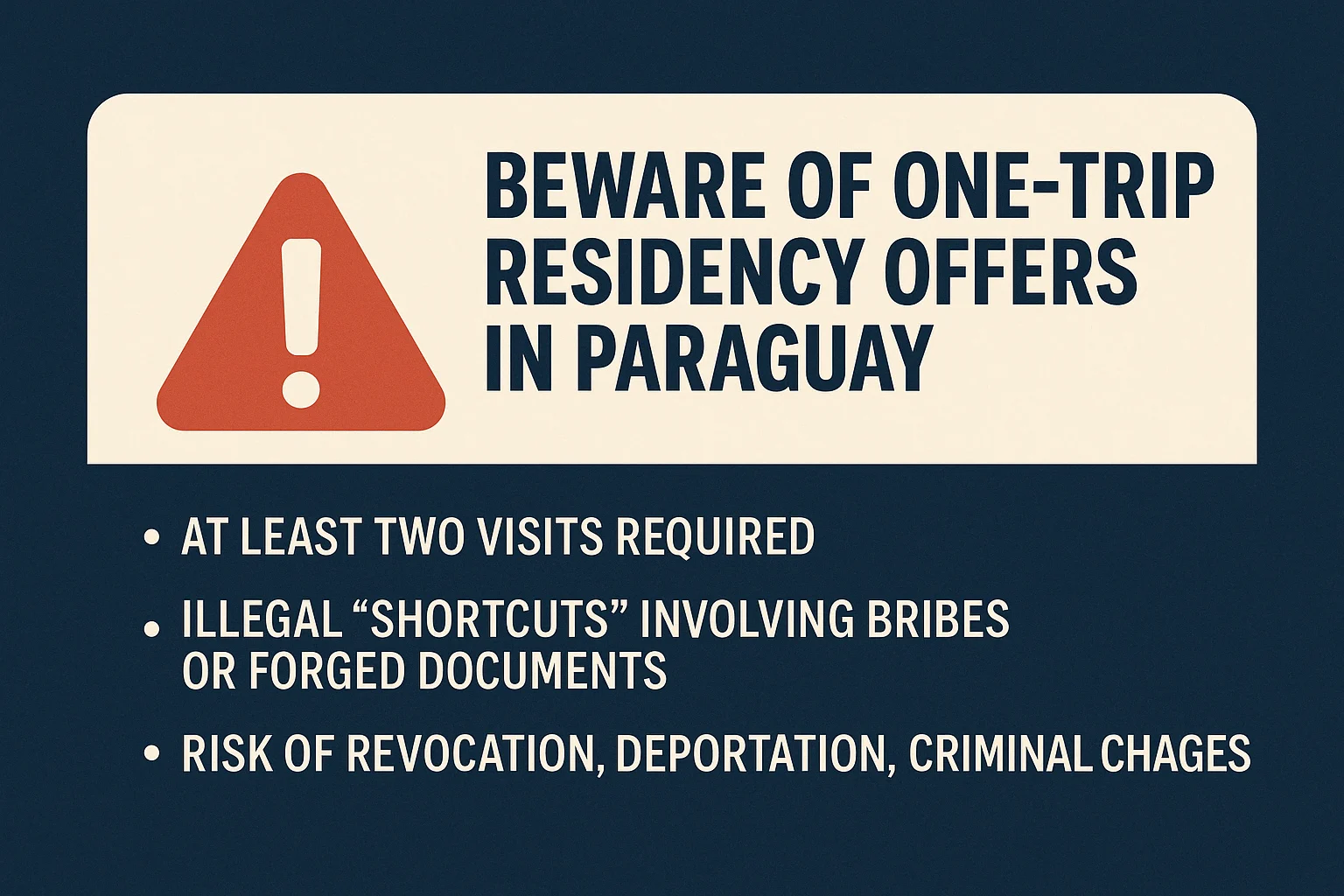In recent years, Paraguay has become an increasingly attractive destination for those seeking tax-friendly residency options in South America. However, with the rise in popularity, a troubling trend has emerged: intermediaries offering to secure Paraguayan residency for foreigners with just one visit – or in some cases, even entirely remotely.
As appealing as these offers may sound, they are not only legally questionable but can also lead to serious consequences, including deportation, the invalidation of your residency status, or even being implicated in corruption cases. Let’s break down the facts.
The Legal Process Requires At Least Two Visits
According to the official guidance from the Dirección Nacional de Migraciones, obtaining temporary or permanent residency in Paraguay involves multiple steps, most of which must be done in person:
- Visit 1: Submission of all required documentation, including:
- Apostilled birth certificate
- Background checks from your country of origin and INTERPOL
- Entry stamp in Paraguay
- Proof of financial means or sworn declaration
- Medical certificate and residency affidavit
- Visit 2: After your application is processed (which may take several weeks), you must return to:
- Finalize biometric data
- Pick up your residency resolution
- Apply for and collect your Paraguayan ID (Cédula de Identidad)
This process is confirmed in multiple legal frameworks including Resolución D.N.M. No. 1249, which regulates the withdrawal of official documents, and supports the idea that physical presence is necessary for proper verification and legal compliance.
Why “One-Visit” Offers Are Dangerous
Some facilitators claim to use their “connections” to obtain all required documents and approvals during a short trip — or even on your behalf without you ever setting foot in the country again. While this may appear convenient, it often involves bribery, document forgery, or bypassing legal protocols.
It’s no secret that corruption remains an issue in some public sectors in Paraguay. While many things “can” be done with a bribe, that doesn’t mean they should be — especially if you are looking for a legal and lasting solution.
Once authorities discover that a residency was obtained through irregular channels:
- Your residency may be revoked
- You may be blacklisted from future immigration applications
- You could be deported or banned from reentry
- In some cases, your data may be handed over to INTERPOL or regional agencies
Legal vs. Illegal: Know the Difference
Residency obtained legally grants you rights, protections, and the ability to reside long-term in Paraguay with peace of mind. Residency obtained through unofficial channels is a ticking time bomb.
The Paraguayan immigration authority regularly updates its internal procedures to combat fraud and illegal intermediaries. For example, earlier documents such as Resolución D.N.M. No. 710 included rules like the 12-month stay requirement for temporary residents, but newer resolutions such as No. 1249 have been introduced to refine the framework. However, none of these changes eliminate the need for your presence or legal compliance.
Final Thoughts: If It Sounds Too Easy, It Probably Is
Don’t fall for shortcuts. Legal residency in Paraguay takes time and effort, but it’s absolutely achievable if you follow the right steps and use legitimate, transparent assistance — such as licensed law firms or working directly with Migraciones.
Avoid any intermediary who:
- Promises a “Cédula in 3 days”
- Says you’ll “never need to come back”
- Doesn’t require original apostilled documents
- Refuses to sign a proper legal service agreement
Your future in Paraguay — and your international reputation — is not worth risking for a bribe.
Legal Crackdowns on Fraudulent Residency: Real Precedents from Paraguay
Paraguay has, on multiple occasions, revoked residency permits from foreigners who obtained them through illegal or unethical means. These cases often involve falsified documents, the use of intermediaries who bypass official procedures, or outright bribery of public officials. For example, in recent years, the Dirección Nacional de Migraciones has conducted internal audits and investigations resulting in the annulment of permanent and temporary residencies that were granted based on manipulated police records or incomplete applications – some of which were processed in suspiciously short timeframes. Following the introduction of Law No. 6984/2022, which modernized the immigration system, the government significantly tightened control over documentation, verification of background checks, and the chain of custody for immigration files.
Additionally, reports in local media have highlighted at least two high-profile cases in which intermediaries were investigated for charging thousands of dollars in exchange for illegally expediting cédulas and residency approvals. Those involved not only lost their legal status but were also banned from re-entering Paraguay and faced legal proceedings for immigration fraud and corruption. These precedents make it clear: while certain things can be achieved with a bribe in Paraguay, doing so places you in direct violation of national and international law – and authorities are actively cracking down on this kind of abuse.
Looking to obtain legal residency in Paraguay, invest in property, or relocate with confidence?
Our team specializes in assisting international clients with all key aspects of moving to and investing in Paraguay, including:
- Legal residency and immigration support
- Purchase of land, apartments, and investment properties
- Company formation and legal structuring
- Tax optimization for individuals and businesses
- Guidance on long-term stays, relocation, and local compliance
With on-the-ground presence in Asunción and multilingual support in English, Spanish, and Polish, we offer trusted expertise and personalized assistance every step of the way.
If you’re considering Paraguay for lifestyle, investment, or strategic relocation, we invite you to get in touch with us for a confidential consultation.
Contact us to discuss your goals and receive expert guidance tailored to your needs.






Leave a Reply